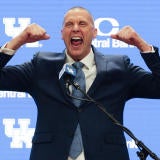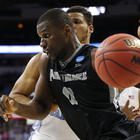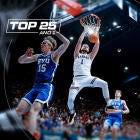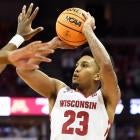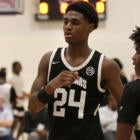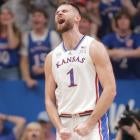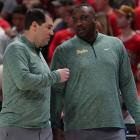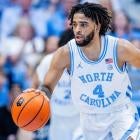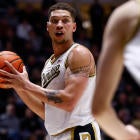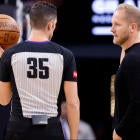Finally, we now basically know who is and isn't in the 2017 NBA Draft.
That's because the deadline for underclassmen to withdraw was late Wednesday. And in the 48 hours leading up to it, most of the on-the-fence prospects -- Nigel Hayes, Malik Newman, Marcus Lee, Caleb Swanigan, etc., -- recognized they were unlikely to be selected in the first round and opted to return to school. In Lee's and Newman's cases, exactly which school remains undetermined. But they're not in the NBA Draft. That's the point. So with a better picture of the players who will be available next month, an updated mock NBA Draft is below.

NBA Mock Draft
| 1. Philadelphia 76ers | |
 | Brandon Ingram, SF, Duke: Ingram didn't enter college with the same level of hype as other recent one-and-done stars. But he averaged 17.3 points and 6.8 rebounds while helping a limited roster win 25 games and advance to the Sweet 16 of the NCAA Tournament. As I've written before, I could argue for Ingram or Ben Simmons going first overall. I like them both. But I personally prefer Ingram, who would fit nicely next to Jahlil Okafor and Nerlens Noel -- not to mention Joel Embid -- in Philadelphia. |
| 2. Los Angeles Lakers | |
 | Ben Simmons, SF, LSU: It's known in basketball circles that Simmons would rather be in Los Angeles as the No. 2 overall pick than in Philadelphia as the No. 1 overall pick. So will he even meet with, or workout for, Philadelphia? Maybe not. Consequently, Simmons could get exactly what he wants. And the Lakers could get exactly what they want, which is a unique talent who projects as a future All-Star. |
| 3. Boston Celtics | |
 | Jamal Murray, SG, Kentucky: Murray did things this season that no other Kentucky freshman who has played under John Calipari -- John Wall, Anthony Davis, Karl-Anthony Towns, etc., -- had ever done, and he'll be the latest one-and-done star to bounce from Lexington. This is higher than most have Murray. But I just don't see a reason why his game won't translate to the NBA. He could be a big scorer for years while helping fix Boston's 3Â-point-shooting issues. |
| 4. Phoenix Suns | |
 | Jaylen Brown, SF, California: The Suns need help on the wing -- and Brown would be the best wing available here. He didn't close strong at Cal. But the 19-year-old athlete was mostly terrific in Pac-12 play. He's a great upside pick who should be capable of guarding three, any maybe even four, positions in the NBA. And that's more important now than ever -- as the Oklahoma City Thunder have shown this postseason. |
| 5. Minnesota Timberwolves | |
 | Dragan Bender, PF, Israel: Bender is widely regarded as the top draft-eligible prospect who didn't play college basketball this season, and there's little doubt he'll be selected in the top half of the lottery. He's an 18-year-old forward who would fit nicely between Karl-Anthony Towns and Andrew Wiggins. Minnesota is going to be really good in a few years, isn't it? |
| 6. New Orleans Pelicans | |
 | Kris Dunn, PG, Providence: The Pelicans don't need to waste another year of Anthony Davis' career, point being they should select somebody who is ready to play immediately. Dunn is that somebody. The 6-4 point guard is probably the most ready-to-play prospect in this draft. I won't be surprised if he's the NBA's Rookie of the Year. He and Davis could develop into the type of inside-outside duo that turns New Orleans into an annual contender. And it could happen quickly because, again, Dunn is a pick-and-plug point guard. He can play on opening night. |
| 7. Denver Nuggets | |
 | Buddy Hield, SG, Oklahoma: Any team that finishes 25th in 3-Âpoint shooting could use a 3Â-point shooter, and there's no better one in this draft than Hield. The CBS Sports National Player of the Year shot 46.4 percent from 3-Âpoint range during his senior season while leading Oklahoma to the Final Four. Simply put, I'll be surprised if Hield isn't a really good NBA player -- because he can create and shoot, and because he has a great work ethic and no red flags. |
| 8. Sacramento Kings | |
 | Denzel Valentine, SG, Michigan State: What Valentine lacks in athleticism he makes up for with a high basketball IQ that allows him to make great decisions on the court and create opportunities for himself and his teammates. He's a playmaker. And playmakers who can dribble, pass and shoot have tremendous value in today's NBA. Dave Joerger didn't have enough of them in Memphis. So adding one in Sacramento would be ideal. |
| 9. Toronto Raptors | |
 | Henry Ellenson, PF-C, Marquette: Toronto has a need at power forward, which makes Ellenson an option. The one-and-done prospect is only 19. And though he didn't shoot a good percentage from beyond the arc at Marquette, he has the tools to be a stretch-four. Combine that with his polished low-post game, and Ellenson has one of the highest ceilings in this draft. |
| 10. Milwaukee Bucks | |
 | Jakob Poeltl, PF, Utah: One of the reasons Poeltl returned to Utah for his sophomore season was to improve as a player and prospect, and he undeniably benefitted from it. He's better in every way after taking Utah to the NCAA Tournament for the second straight season. Last year, he would've likely gone in the 20s. Now he'll go in the lottery. And maybe in the top 10. |
| 11. Orlando Magic | |
 | Skal Labissiere, PF, Kentucky: Labissiere, week of the combine, held a workout in Chicago during which he moved and shot well enough to remind scouts why they fell in love with him in the first place. That doesn't mean his disappointing season at UK should be disregarded. It's a concern. But his talent and potential remains intriguing. He'll be a lottery pick. |
| 12. Utah Jazz | |
 | Timothe Luwawu, SG, France: Luwawu is a wing with good size who is an above-average athlete and defender. Those things alone would get him selected, probably. But the fact that he also shoots about 40 percent from 3-point range makes him a possible lottery pick and nice option for the Jazz even with Rodney Hood and Gordon Hayward already on the roster. |
| 13. Phoenix Suns | |
 | Marquese Chriss, PF, Washington: Chriss is a rarity in that he's a possible lottery pick after one year of college even though he wasn't ranked in the top 50 of his high school class. The 6-10 forward tested as one of the most athletic bigs at the combine, and executives are in love with what he might become. The Suns have three first-round picks. They can afford a big swing here. |
| 14. Chicago Bulls | |
 | Deyonta Davis, PF, Michigan State: A report that Joakim Noah is leaving Chicago via free agency suggests the Bulls could focus on frontcourt prospects -- and Davis would be the best available here. He declined to test athletically at the combine and will likely need to perform well in private workouts to ensure a place in the top 15. But the 6-11 forward showed himself as a high-level rebounder in limited minutes during his one season at Michigan State, and he was also one of the nation's best shot-blockers. So, at worst, Davis should be a difference-maker on the defensive end at the NBA level. |
| 15. Denver Nuggets | |
 | Furkan Korkmaz, SG, Turkey: Korkmaz has negotiated a buyout that will allow him to come to the NBA next season. So that's one less thing executives have to worry about. Still, it's worth noting that the 6-6 guard hasn't had a great season with Anadolu Efes. He's only averaging 8.8 minutes per game. But that won't prevent the 18-year-old from going in the top 20. |
| 16. Boston Celtics | |
 | Domantas Sabonis, PF, Gonzaga: Sabonis skipped the combine completely, which has caused some to believe he might've received a promise from somebody. Whether that's true or not is unclear. But a top-20 promise from a franchise with three first-round picks -- like the Celtics -- would make sense, and it's not like Boston has inspiring power forwards on the roster already. |
| 17. Memphis Grizzlies | |
 | Wade Baldwin IV, PG, Vanderbilt: The Grizzlies need help at point guard -- preferably in the form of somebody who A) is big enough to sometimes play next to Mike Conley, and B) can shoot from the perimeter. Baldwin checks both boxes. And the fact that he measured and tested well at the combine basically guarantees some franchise will take him in the first round. |
| 18. Detroit Pistons | |
 | Tyler Ulis, PG, Kentucky: I've previously had Ulis going 14th to the Bulls. But the Noah news that makes me think Chicago will look to add frontcourt help pushed Ulis out of the lottery. He shouldn't fall too far, however, because Detroit also needs point guard help. Yes, Ulis is small -- which is why he might not work at 17 for Memphis. But I no longer struggle to see him becoming a relevant PG in the NBA because he's so exceptional at lots of the things that tend to matter. |
| 19. Denver Nuggets | |
 | Demetrius Jackson, PG, Notre Dame: Jackson tested and interviewed well at the combine and will be the second straight Notre Dame guard to go in the first round. His ability to flourish in the pick-and-roll while being a respectable shooter -- he shot better than 41 percent form 3-point range in his freshman and sophomore years -- should allow him, in time, to become an NBA starter. And the presence of Emmanuel Mudiay shouldn't matter much. Because there's no reason Jackson and Mudiay can't play together. |
| 20. Indiana Pacers | |
 | Brice Johnson, PF, North Carolina: Johnson was a monster this season while averaging 16.6 points and 10.6 rebounds and leading the Tar Heels to the national championship game. The quick-leaper improved his stock enough to where going in the top 20 of this draft isn't out of the question. And, for the Pacers, he would provide needed depth in the frontcourt. |
| 21. Atlanta Hawks | |
 | Taurean Prince, SF, Baylor: Prince is a 6-8 wing who can make 3-pointers, and his wingspan and athleticism are such that guarding his position, and even multiple positions, at the NBA level should not be an issue. It's also worth noting that he's an 82 percent free-throw shooter. And Prince is an above-average rebounder for his position, too. So he can do a lot of different things to contribute while on the court. |
| 22. Charlotte Hornets | |
 | Malik Beasley, SG, Florida State: Beasley is a guard with decent size who is a tremendous athlete and good-enough shooter -- evidence being that he made 37.8 percent of his 3-point attempts at Florida State. He's a reasonable option for a Charlotte franchise that could use a playmaker next to Kemba Walker. |
| 23. Boston Celtics | |
 | Cheick Diallo, PF, Kansas: Diallo measured and tested well at the combine -- then played well in the five-on-five games. He was active. He rebounded. He guarded. Simply put, the 6-9 forward genuinely helped himself by reminding scouts why he was once a projected lottery pick. And now it looks like that subpar season at Kansas won't cost Diallo too much money. |
| 24. Philadelphia 76ers | |
 | Malachi Richardson, SG, Syracuse: Richardson has parlayed a nice NCAA Tournament into a likely guaranteed NBA contract, which is something few saw coming in, say, February. The 6-6 guard is a good athlete who measured and tested well at the combine. Not everybody likes him. But he has enough fans in certain franchises to secure a spot in the first round. |
| 25. Los Angeles Clippers | |
 | DeAndre' Bembry, SF, Saint Joseph's: Bembry was, by all accounts, terrific at the combine. He tested well and played magnificently in the five-on-five games. His ability to guard multiple positions at the NBA level should prove useful, and the way Bembry sees the floor and passes could allow him to, at times, play the role of point-forward. |
| 26. Philadelphia 76ers | |
 | Thon Maker, PF, Australia: Maker has still never played basketball consistently against high-level competition. But he measured, tested and interviewed well at the combine, where he gained many fans. And now it seems more likely than not that he'll go in the first round based on little more than the idea that his ceiling is higher than most prospects' ceilings. |
| 27. Toronto Raptors | |
 | Stephen Zimmerman Jr., C, UNLV: Zimmerman's freshman season was limited by injury. But he still nearly averaged a double-double in the MWC, and he remains a skilled 7-footer who was a consensus top-10 high school recruit. So, late in the first round, he's worth a flyer. |
| 28. Phoenix Suns | |
 | Juan Hernangomez, PF, Spain: The Suns do not need three players on rookie contracts. So they could go with a draft-and-stash prospect here. Hernangomez qualifies as a great option. He's a 6-9 20-year-old stretch-4 who is shooting roughly 40 percent from 3-point range in Spain. |
| 29. San Antonio Spurs | |
 | Jarrod Uthoff, SF, Iowa: A skilled forward who can shoot from the perimeter and rebound sounds like something the Spurs might be interested in, and Uthoff is exactly that. He averaged 18.9 points and 6.3 boards while shooting 40 percent from 3-point range this season. The more scouts see him, the more they tend to like him. His so-called upside might not be the same as some younger prospects. But Uthoff definitely has the tools to play in the NBA. |
| 30. Golden State Warriors | |
 | Ben Bentil, PF, Providence: Bentil is a long and athletic forward who can score from multiple spots -- around the rim or and all the way out to the 3-point line. He was terrific this season at Providence, and he played well in the five-on-five games at the combine. Given how much Golden State asks players to be versatile - and how much Steve Kerr likes his team to shoot from the perimeter from four positions - Bentil would make a lot of sense in a Warriors uniform. |











